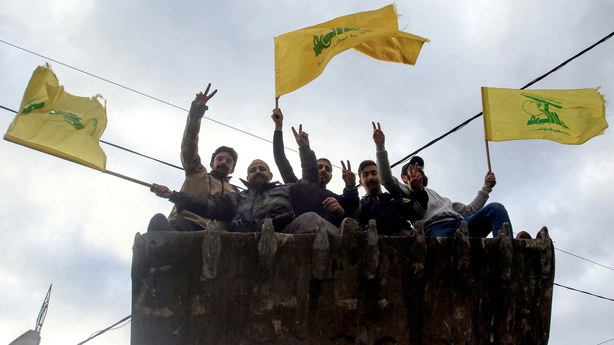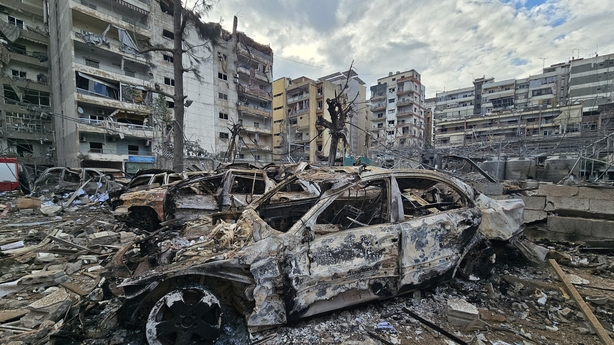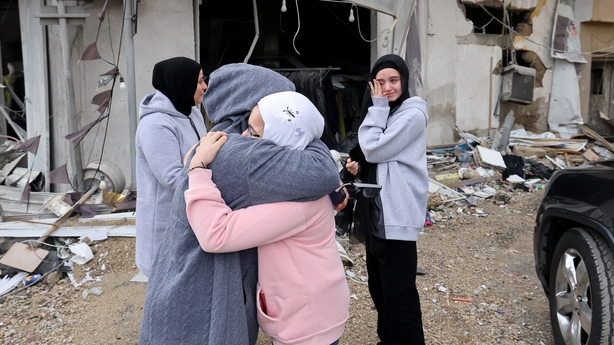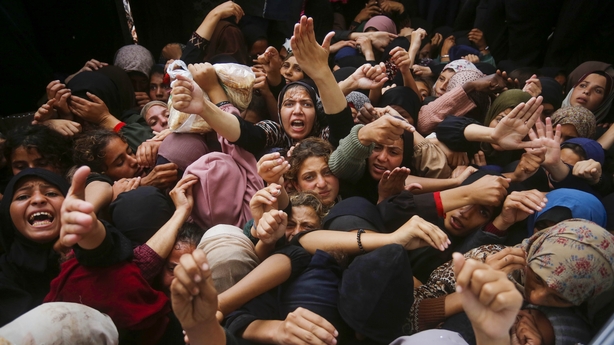A ceasefire between Israel and the Lebanese armed group Hezbollah has held, after the two sides struck a deal brokered by the US and France, but Israel has warned local residents not to return to the border area yet.
The ceasefire agreement, a rare diplomatic feat in a region wracked by conflict, ended the deadliest confrontation between Israel and the Iran-backed militant group in years, but Israel is still fighting the Palestinian militant group Hamas in Gaza.
Cars and vans piled high with mattresses, suitcases and even furniture streamed through the heavily-bombed southern port city of Tyre, heading south where hundreds of thousands of people had been forced to flee their homes by the violence.
However, the Israeli army's Arabic spokesperson cautioned southern Lebanon residents against moving south of the Litani river from 5pm local time (3pm Irish time) to 7am, noting that Israeli forces were still present in the area.
Hezbollah proclaims 'victory' over Israel
Hezbollah said it had achieved "victory" over Israel and that its fighters were at the ready, after a truce between the two sides took effect.
"Victory from God almighty was the ally of the righteous cause," a statement from the Iran-backed group said, adding that its fighters "will remain in total readiness to deal with the Israeli enemy's ambitions and its attacks".
The militant group has vowed to continue its resistance and support Palestinians, including fighters.
In the first statement by Hezbollah's operations centre since the deal was announced, the group made no direct mention of the ceasefire deal.
"The Islamic resistance's operations room affirms that its fighters in all military disciplines will remain fully equipped to deal with the aspirations and assaults of the Israeli enemy," the group said.
It added that its fighters would continue to monitor the withdrawal of Israeli forces beyond the Lebanese borders "with their hands on the trigger".
Lebanon's army, tasked with ensuring the ceasefire lasts, said it began deploying additional troops south of the Litani river, into a region heavily bombarded by Israel in its battle against Hezbollah.
The river runs about 30km north of Israel's border.
Israel's attacks have also struck eastern cities and towns and Hezbollah's stronghold in the southern suburbs of Beirut. Israeli troops have pushed around 6km into Lebanon in a series of ground incursions launched in September.

Under the terms of the ceasefire, Israeli forces can remain in Lebanon for 60 days and Israeli Prime Minister Benjamin Netanyahu said he had instructed the military not to allow residents back to villages near the border, after four Hezbollah operatives were detained in the area.
The Lebanese army urged returning residents not to approach areas where Israeli forces were present for their own safety.
The ceasefire deal, which promises to end a conflict across the Israeli-Lebanese border that has killed thousands of people since it was ignited by the Gaza war last year, is a major achievement for the US in the waning days of President Joe Biden's administration.

Diplomatic efforts will now turn to shattered Gaza, where Israel has vowed to destroy Hamas, which led the 7 October 2023, attacks on Israeli communities.
However, there were no hopes of peace returning any time soon to the Palestinian enclave.
Israel has said its military aim in Lebanon had been to ensure the safe return of about 60,000 Israelis who fled from their communities along the northern border when Hezbollah started firing rockets at them in support of Hamas in Gaza.
In Lebanon, some cars flew national flags, others honked, and one woman could be seen flashing the victory sign with her fingers as people started to return to homes they had fled.
Many of the villages the people were likely returning to have been destroyed.

End to 'awful bloodshed' - Taoiseach
The Taoiseach welcomed the ceasefire, saying it brought to an end "the awful bloodshed", which brought devastation to civilians.
Simon Harris said Ireland will continue to support efforts to help Lebanon fulfil its commitments under the deal and its commitment to UNIFIL.
'Permanent cessation'
Announcing the ceasefire, Mr Biden spoke at the White House shortly after Israel's security cabinet approved the agreement in a 10-1 vote.
"This is designed to be a permanent cessation of hostilities," Mr Biden said.
"What is left of Hezbollah and other terrorist organisations will not be allowed to threaten the security of Israel again."
Israel will gradually withdraw its forces as Lebanon's army takes control of territory near its border with Israel to ensure that Hezbollah does not rebuild its infrastructure there after a costly war, Mr Biden said.
He said his administration was also pushing for an elusive ceasefire in Gaza.

National security adviser Jake Sullivan said the US would start its renewed push for a Gaza ceasefire.
The Israeli military said Israeli forces fired at several vehicles with suspects, to prevent them from reaching a no-go zone in Lebanese territory and the suspects moved away.
Israeli Defence Minister Israel Katz said he instructed the military to "act firmly and without compromise" should it happen again.
Hezbollah political figure Hassan Fadlallah said that the group would retain the right to defend itself if Israel attacked.
The ceasefire would give the Israeli army an opportunity to rest and replenish supplies, and isolate Hamas, Mr Netanyahu said.
"We have pushed them [Hezbollah] decades back. We eliminated Nasrallah, the axis of the axis. We have taken out the organisation's top leadership, we have destroyed most of their rockets and missiles," he added.

